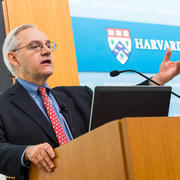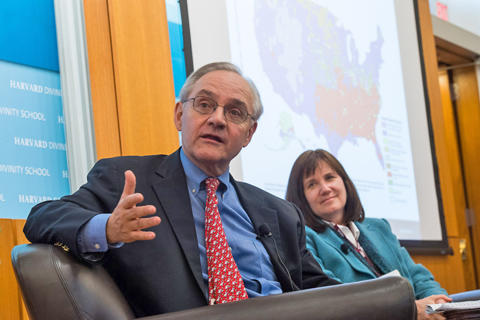
While visiting Harvard Divinity School, Washington Post columnist E.J. Dionne planned to speak about how Pope Francis and Republican presidential candidate Donald Trump are changing religion's role in American politics.
But on the morning of his talk, something unusual happened. Democratic presidential hopeful Bernie Sanders was invited to speak at the Vatican.
"Try to imagine a Democratic presidential candidate over the last 20 or 30 years being invited to the Vatican in the middle of a campaign, and what makes it even better is it's a Jewish Socialist Democratic presidential candidate being invited to the Vatican," said Dionne.
Dionne shared his insight on America's political landscape—and the influence religion has on it—during the Dean's Leadership Forum on April 8 when a crowd of scholars, students, and leaders gathered at HDS to hear discussions on critical issues in religion today.
"You have an election where the Evangelical movement is split, where the Democratic front-runner may find salvation through public engagement with religion, and you have a Jewish Socialist heading off to the Vatican to make a case about climate change and social justice that is in fact quite congenial to Pope Francis's world view. In American politics right now, religion is working in mysterious ways," Dionne explained.
In thinking about Pope Francis's impact on the campaign going forward, Dionne noted something striking. He said the two candidates who like to quote Pope Francis the most during the campaign are the Democratic candidates. The Republican candidates don't quote Pope Francis as much, which is not something that would have been the case a few years ago.
As part of the event, Dionne sat down for a conversation with Catherine Brekus, Charles Warren Professor of the History of Religion in America at HDS. Brekus said that this was "a fascinating moment in terms of the influence of religion in politics," and asked Dionne about the dueling models of human flourishing coming from Trump and the pope.
"Trump seems to say that the way to make the world better is to get rid of any restrictions on individual freedom," Brekus said. "The pope, and other social justice advocates, seem to suggest that we do need some limitation on human freedom and individualism for human flourishing."

Americans, Dionne said, have been for a long time deeply divided between a devotion to individualism and a deep affection for community.
"I think this division goes right down the middle of so many of us," he said. "What's peculiar about Trump is that he, in many ways, has brought to our shores a kind of right-wing European nationalist politics."
Turning to the Democrats, Dionne also discussed something that presidential contender Hillary Clinton could do to help what the media describes as her authenticity problem: be out front and embracing of her Methodist faith and its social demands.
"I believe from conversation, and from conversations with a lot of others, that the old social Methodist in Hillary is a deeply authentic Hillary Clinton. It is who she is, and this would convey something that her campaign hasn't conveyed very much," he said. "When she quotes John Wesley out on the campaign trail, she seems to light up, and I think voters notice that."
While he isn't a Divinity School alumnus, Dionne's understanding of religion comes in part from HDS. Dionne, a Harvard College graduate (AB '73), has fond memories of HDS during his time on campus. He recalled that when he was a student, Harvard began to allow undergraduates to enroll in Divinity School courses and that he and friend took advantage of the opportunity.
"My favorite class on my transcript was Professor Harvey Cox's eschatology and politics course, which is continually relevant to life," he said, adding that it was the most professionally useful course he took.
Dionne praised the research done by two MDiv candidates, Casper ter Kuile and Angie Thurston, who spoke before Dionne at the Dean's Leadership Forum on how they have examined ways religiously unaffiliated millennials, also called the "religious nones," find and form community.
Dionne added that the role of the nones is quite an important one in this election, particularly for the Democratic Party.
"They suggest a real coalition management problem the Democrats have that's quite different than the Republicans," said Dionne. "The Democrats include the most religious people in America, who are, by most measures, African Americans, and the least religious people in America—the people most hostile to religion in America—and the Democrats have to hold this whole thing together. So, if you think the Democrats look incoherent on this question, that's why, and it's a real struggle."
—by Michael Naughton
